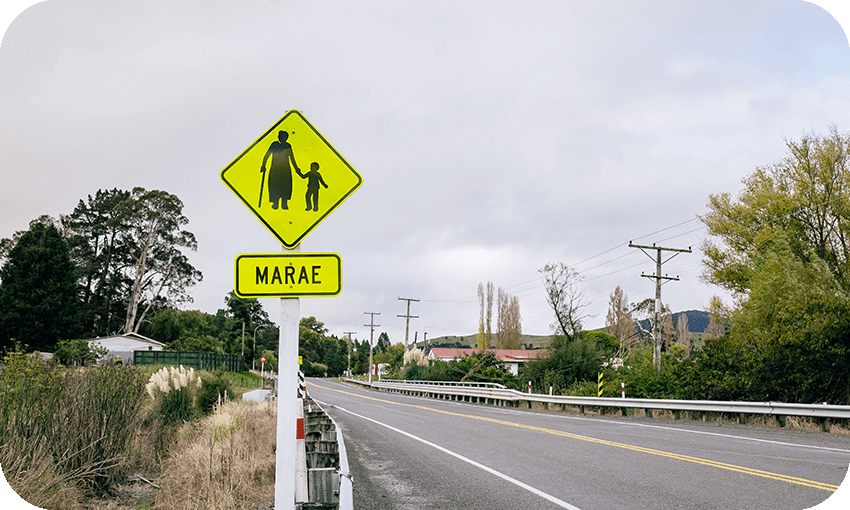Aotearoa’s new official marae traffic signs are an important addition to our roadsides, writes Airana Ngarewa.
A number of new traffic signs are slowly popping up around Aotearoa. They come in two varieties, a yellow hazard sign picturing a kui and her moko hand-in-hand, and a kōkōwai cultural marae sign picturing a whare tupuna.
These tohu were designed by Waka Kotahi to meet the needs of Māori communities who have been asking for official marae traffic signs. They were first posted around Otaki and Levin earlier in the year and have since been erected at approximately 30 marae, predominantly on the east coast and in Northland.
The impact of these tohu cannot be understated. Marae are the hubs of te ao Māori serving as pre-schools, churches, playgrounds, whare wānanga, homesteads and venues for almost every major life event. Not only do these new tohu help keep our young and old safe but they also give greater visibility to our marae, our reo and te ao Māori more broadly.
Here are five reasons every marae should write to their local council (if the marae is on a local road) or Waka Kotahi (if it’s on the State Highway network) and request a cultural marae sign for their pāpākainga.
1. They represent us
While the yellow and black signposts penned with the name of our marae have done their job, they do not represent the kōrero tuku iho nor the values found within te ao Māori.
The kōkōwai is the same colour found on many carvings on Marae. The colour itself is a representation of te whaiao and te ao mārama, calling back to the story of how Tāne in his search to create the first woman found the soil from which to make her at Kurawaka. The stories tell that this is the puke of Pāpātuanuku and that the soil there was red. On my own pāpākainga, Pariroa, the walls of our whare tūpuna state that red alongside black and white is also used as a representation of te ao hou, the connections we must foster in this new world between ourselves as tāngata whenua and those who have come from afar.
2. They cement our place as mana whenua
Every generation of Māori had their own fight. For our old people, it was keeping embers of our reo alive while schools and society more broadly sought to rob them of it. The next generation sought to see it revived, have it acknowledged as an official language of Aotearoa and have it taught in the same schools that would once beat kids for speaking it. Our generation’s challenge is to normalise the reo, to ensure everyone with an honest desire to learn it has the opportunity to do so and to plaster our language on every shop and street corner from Otou to Waikawa.
3. They keep our kids and our old people safe
The problem of road safety is an issue for many marae. Each one has its token traffic warden who will stand up annually at their AGM and ask what is being done to make the roads that surround their pāpākainga safer. Even I have penned letters to my local council and Waka Kotahi about the need to have the roads to my own marae widened. However, until every marae in Aotearoa can cater both to pedestrians and two lanes of traffic, we need to do everything we can to ensure drivers know that children and old people are about.
As a bonus with your sign, you’ll get a built-in answer to the next query from your local token traffic warden.
4. They are not one size, one design fits all
These tohu come with four different motifs which sit behind the whare tupuna and also without one if that is preferred. There is the harakeke flax weave, the first method of raranga an aspiring ringatoi will learn. There is the niho taniwha, literally translated to mean the teeth of the taniwha. There is the Poutama which looks like steps and is said by some to represent the journey of Tāwhaki to claim the three kete of knowledge from the highest heaven. Finally, there is also the pātiki which represents the flounder. This design is said to acknowledge the tireless mahi of our wāhine who would forage and hunt deep into the night which was the time it was thought best to catch flounder.
Every marae will have their own version of these stories and their own interpretations of these tukutuku patterns and it makes sense that every marae should decide which motif, if any, would work best for them.
5. It is an act of kindness to our manuhiri
Many of our manuhiri come from far away and not all of our marae have made it on Google maps yet. It is my belief that our duty to manaaki our manuhiri extends far beyond our waharoa and we should make things as easy for them as possible. How much easier could we make them than by plastering big red poutohu that read in no uncertain terms that the place you are looking for is this way?
This is Public Interest Journalism funded through NZ On Air.





